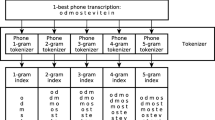Abstract
In this paper, we propose a document topic model (DTM) which is based on the non-negative matrix factorization (NMF) approach, to explore Japanese spontaneous spoken document retrieval. Each document is interpreted as a generative topic model, belonging to many topics. The relevance of a document to a query is expressed by the probability of a query word being generated by the model. Different from the conventional vector space model where the matching between query and document is at the word level, the topic model complete its matching in the concept or semantic level. So, the problem of term mismatch in the information retrieval can be improved, that is, the relevant documents have possibilities to be retrieved even if the query words do not appear in them. The method also benefit the retrieval of spoken document containing “term misrecognitions”, which is peculiar to the speech transcripts. By using this approach, experiments are conducted on a test collection of corpora of spontaneous Japanese (CSJ), where some of the evaluating queries and answer references are suited to retrieval in semantic level. The retrieval performance is improved by increasing the number of topics. When the topic number exceeds a threshold, the NMF’s retrieval performance surpasses the tf-idf-based vector space model (VSM). Furthermore, compared to the VSM-based method, the NMF-based topic model also shows its strongpoint in dealing with term mismatch and term misrecognition.
Preview
Unable to display preview. Download preview PDF.
Similar content being viewed by others
References
Hoffmann, T.: Probabilistic latent semantic indexing. In: Proceedings of the SIGIR 1999, pp. 50–57 (1999)
Chen, B.: Word topic models for spoken document retrieval and transcription. ACM Transactions on Asian Language Information Processing (TALIP) 8(1), 1–27 (2009)
Lee, D., Seung, H.S.: Algorithms for non-negative matrix factorization. In: NIPS, vol. 13 (2001)
Kita, K., Tuda, K.H., Sisibori, M.: Information Retrieval Algorithms. Kyoritu Press (2003)
Maekawa, K.: Corpus of spontaneous Japanese: its design and evaluation. In: SSPR 2003 (2003)
Akiba, T., Aikawa, K., Itoh, Y., Kawahara, T., Nanjo, H., Nishizaki, H., Yasuda, N., Yamashita, Y., Itou, K.: Test collection for spoken document retrieval from lecture audio data. In: Proceedings of the LREC 2008 (2008)
Saraclar, M., Sproat, R.: Lattice-based Search for Spoken Utterance Retrieval. In: Proc. of HLT-NAACL, pp. 129–136 (2004)
Nakamura, S., Markov, K., Nakaiwa, H., Kikui, G., Kawai, H., Jitsuhiro, T., Zhang, J., Yamamoto, H., Sumita, E., Yamamoto, S.: The ATR multilingual speech-to-speech translation system. IEEE Trans. on Audio, Speech, and Language Processing 14(2), 365–376 (2006)
Author information
Authors and Affiliations
Editor information
Editors and Affiliations
Rights and permissions
Copyright information
© 2009 Springer-Verlag Berlin Heidelberg
About this paper
Cite this paper
Hu, X., Kashioka, H., Isotani, R., Nakamura, S. (2009). Japanese Spontaneous Spoken Document Retrieval Using NMF-Based Topic Models. In: Lee, G.G., et al. Information Retrieval Technology. AIRS 2009. Lecture Notes in Computer Science, vol 5839. Springer, Berlin, Heidelberg. https://doi.org/10.1007/978-3-642-04769-5_13
Download citation
DOI: https://doi.org/10.1007/978-3-642-04769-5_13
Publisher Name: Springer, Berlin, Heidelberg
Print ISBN: 978-3-642-04768-8
Online ISBN: 978-3-642-04769-5
eBook Packages: Computer ScienceComputer Science (R0)




